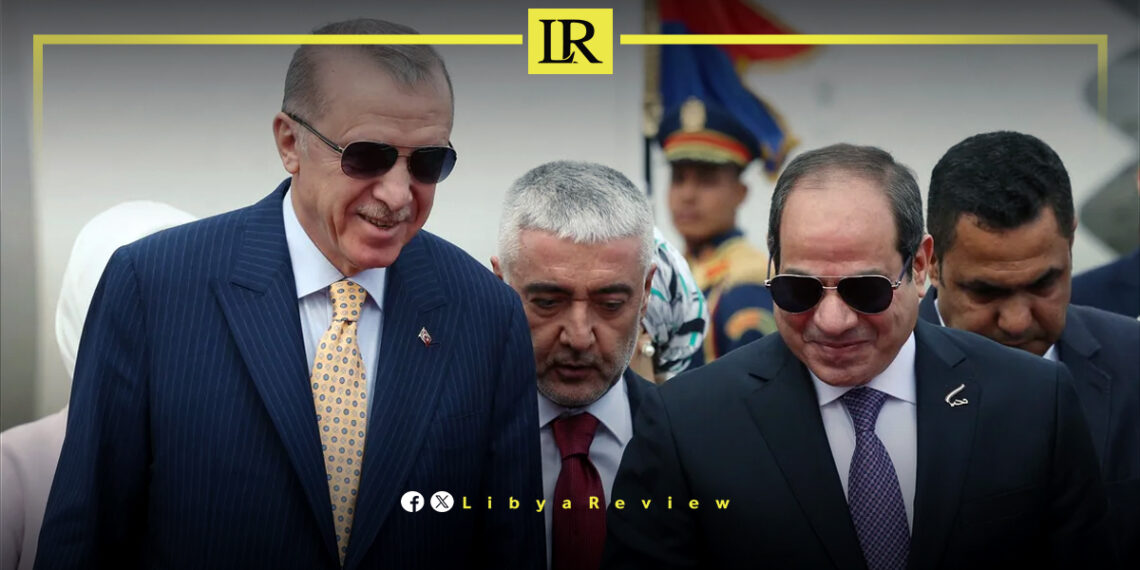Egypt and Turkey are actively collaborating to address Libya’s latest political and economic crisis, a significant shift given their former opposition in the 2019 Battle of Tripoli.
According to a report by Bloomberg, both countries are now using their influence to push Libya’s rival governments toward a resolution that could end the ongoing oil blockade and stabilize the region.
Officials and diplomats, who spoke on condition of anonymity, revealed that Cairo and Ankara are applying pressure on the Libyan factions to reach an agreement that would restore oil production, crucial for both Libya’s economy and global markets. In a surprising move, Turkey has even engaged in talks with Field Marshal Khalifa Haftar, the General Commander of the Libyan National Army (LNA) to discuss control over the Central Bank of Libya, a critical institution managing the country’s oil revenues.
Bloomberg’s sources emphasized that the combined efforts of Egypt and Turkey have significantly reduced the likelihood of a full-scale war in Libya. Their cooperation has not only lowered tensions but also facilitated the return of Egyptian workers and businesses to western Libya, and Turkish companies to the east.
Egypt and Turkey are capitalizing on their recently renewed diplomatic ties to solve Libya’s internal conflict, which threatens to devolve into civil war. Libya, a key member of OPEC, remains locked in a power struggle that centers around control of its oil wealth and the leadership of the Central Bank of Libya.
The standoff over the Central Bank’s leadership began last month when Libya’s Presidential Council dismissed Sadiq al-Kabir, the long-serving governor responsible for managing oil revenues. In response, the eastern-based House of Representatives government halted oil production, cutting off vital exports, primarily to southern Europe. The move sent shockwaves through the oil market, further destabilizing Libya’s already fragile economy.
Despite recent talks between representatives of the Libyan Parliament and the High Council of State, no definitive agreement has been reached on resolving the Central Bank crisis. While both sides have committed to continuing discussions, the deadlock remains, leaving Libya’s economy in a precarious position.
According to Bloomberg, Libya’s oil exports have dropped dramatically over the past week, with shipments reduced to just one every two or three days, compared to the previous rate of daily exports earlier in the month. The ongoing dispute over the Central Bank’s leadership has directly contributed to this decline, as the lack of an agreement has stalled oil production, exacerbating the economic crisis.
This joint effort between Egypt and Turkey comes on the heels of a high-profile meeting between Egyptian President Abdel Fattah al-Sisi and Turkish President Recep Tayyip Erdoğan in Ankara. The summit held less than two weeks ago, marked a turning point in relations between the two countries after years of tension. Both leaders are now focused on building stronger ties, particularly in areas such as energy, defense, and regional conflicts, including Libya.
For years, Egypt and Turkey were on opposite sides of the Libyan conflict. Turkey supported the Tripoli-based Government of National Unity, while Egypt backed Haftar’s Libyan National Army in the east. However, shifting regional dynamics and the desire for greater stability have led both countries to reevaluate their positions and work together toward a peaceful resolution.
Libya has been embroiled in conflict since the 2011 overthrow of longtime leader Muammar Gaddafi. Since then, the country has been divided between rival factions, each vying for control over its vast oil wealth. Despite several attempts at peace, including a 2020 ceasefire, the country remains politically fractured, with two competing governments based in the east and west.
Libya’s oil resources are central to the conflict. As Africa’s largest holder of proven oil reserves, Libya’s oil exports are crucial to both its economy and global energy markets. However, ongoing instability has repeatedly disrupted oil production, causing uncertainty for both Libya and its trading partners.


